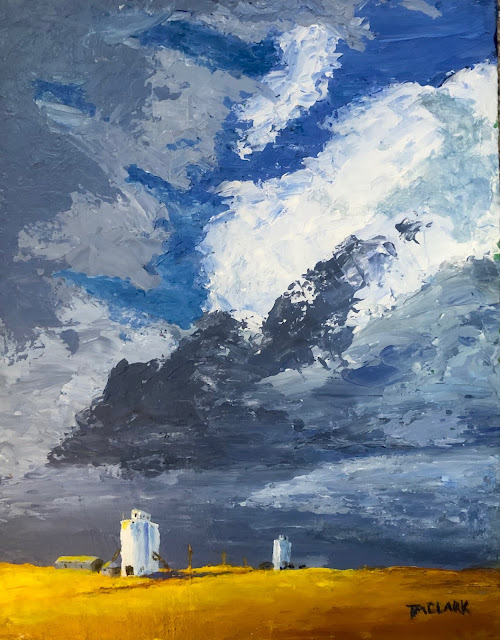 | ||
|
"Paint for yourself," advised a Taos landscape artist in an art magazine I bought yesterday.
The advice came at the right time, as I had started a painting twice and stalled. Sometimes art has to brew or stew, like good coffee or chili, needing more ingredients.
On my computer screen was a photo I'd taken a couple of years before on one of my many trips into and across the Texas Panhandle, heading west. There's always something to see out there on the Great Plains, in the sky, in the wide open spaces, in the weather, in the ever-changing light..
I've tried painting it in watercolor before and been too fussy. But I wanted use it as a reference for what I love to paint, what inspires me...the skies, the open spaces, the old buildings, the stories.
I made a value sketch, still stewing. Then I began mixing paint with a palette knife, experimenting, forgetting, or ignorant of, any rules, having fun.
Today's painting is all palette knife work, except for the two grain elevators and buildings. The sky is mixed with variations of only three colors, plus white--Ultramarine and cerulean blue, and burnt sienna. The little foreground is yellow ochre, azo yellow, and burnt sienna, plus the blues for shadows
I took the photo driving about 75 on I-40, east of Amarillo with storm clouds rolling in, and abandoned elevators capturing my attention. Obviously I used my artistic license on composition and color.
I've noticed since trying to learn acrylics that most of my work is vertical, compared to most of my horizontal watercolors. I don't know why. This was easy though, to show the immensity of the sky, the open spaces, and the smallness of humans.
Notes: I'm having trouble with a title that fits the painting I'm happy with, that I painted for myself. The photo darkened that main cloud a little more than it is. This is also, I just realized, essentially a study in complementary colors, adding to the interest and contrast.It will be available soon at In Your Eye Studio & Gallery in Paseo Arts District.






















